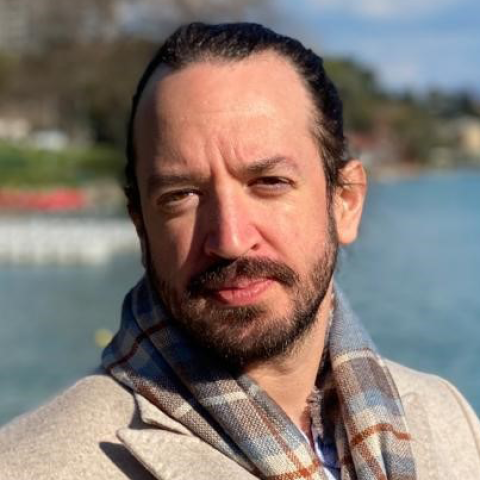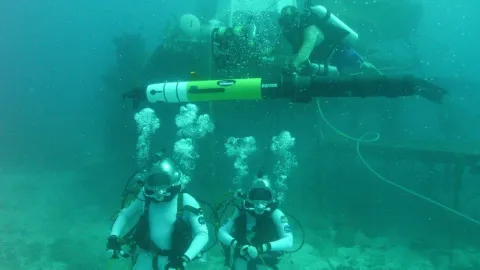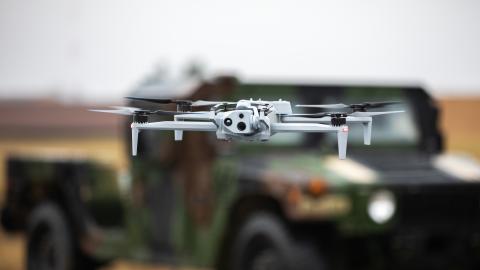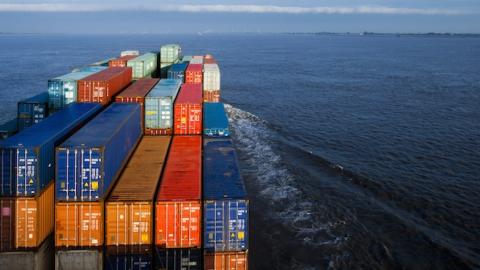Hurd's Bank, July 2015
Sixteen miles out to sea from Valletta, Malta, safely into international waters, dozens of large ships sit at anchor in July of last year. An hour before the late summer sunset, the sea and sky are nearly the same blue. That day, more than forty vessels are in the free, shallow-water harbor known as Hurd’s Bank. Crew members—pudgy men in cheap sportswear—lounge on the rails of their vessels, enjoying the end of the day. Ship owners often leave skeleton crews on board these vessels, who are supplied with food and water from shore. They wait for the right moment or the right deal for their often-illicit cargos. Hurd's Bank isn't the only such free offshore anchorage in the world, but it's the only one in Europe.
It's a peaceful scene, but Hurd's Bank helps keep the slow-burning Libyan civil war going. Many of the vessels here are tankers, and some carry diesel purchased in Libya at the local, subsidized price, diesel which is then illegally exported to be sold for 15 to 20 times as much off the coast of Malta. The tankers that hold Libyan diesel here have loaded it at western Libyan ports, such as Zuwara. Buying at the subsidized price—or simply appropriating the fuel—and selling a few hundred miles away on Hurd's Bank is an easy way for
Libya's militias to finance themselves.
Among the ships out on Hurd's Bank in the summer of 2015 were "two vessels that are involved in fuel smuggling," according to a recent report by the U.N. Security Council Panel of Experts on Libya. One was the Amazigh F, an oil tanker owned by the Basbosa Shipping Company. The Marshall Islands address of Basbosa Shipping is the same as that of ADJ Swordfish Ltd. (now ADJ Trading, Ltd.), a company controlled by a Libyan named Fahmi Ben Khalifa together with investors from Malta and Egypt. The other of the two ships was the Basbosa Star, then owned by ADJ Swordfish.
Before anchoring off Malta that July, both the Amazigh F and the Basbosa Star had sailed to Libya multiple times. And on each of their trips, the U.N. panel notes, the ships had shut down their automatic identification systems as they approached the Libyan coast, "following the pattern of smugglers."
"One individual stands out in the fuel smuggling business from Zwara," the U.N. panel writes: Fahmi Ben Khalifa, also known as Fahmi Salim. "He has a long record of smuggling. During the Qadhafi regime he was imprisoned for a period for drug smuggling." In addition to his Maltese company, Fahmi Salim "also chairs the board of directors of a Libyan company, Tiuboda Oil and Gas Services Limited," the panel details. Fahmi Salim had tried to get a proper license to bring fuel into Malta from Libya, but Maltese officials rejected the request. That didn't stop him from doing business.
Both the Basbosa Star and Amazigh F spent most of their time shuttling between Malta and Libya; both operated out of the same Marshall Islands address. But they have something else in common: They are among the hundreds of vessels flying the flag of Palau. The Basbosa Star changed its flag from Sierra Leone to Palau in February of last year; the Amazigh F was Palau-flagged beginning early in 2014. (A year ago, the ship's name was changed to Sea Master X.) The activities of the Basbosa Star, Sea Master X, and other Palau-flagged vessels point to the larger problem of regulating the world's many "flags of convenience." The proliferation of fast-growing, obscure shipping registries offers rogue owners many opportunities to dodge authorities.
The Republic of Palau is a far-flung Micronesian nation made up of hundreds of small islands east of the Philippines. With a population of 21,000, its total landmass is equal to about that of Norman, Oklahoma. Made into an American territory after World War II, Palau became independent in 1994. The country uses the U.S. dollar as its currency, and English is an official language along with Palauan. The cash-strapped little country has relied on fishing and tourism for its scanty revenues. In September 2012, the Palau Registry was launched with two Chinese gambling ships, adding registering vessels to Palau's endeavors.
Palau is just one of dozens of flags of convenience, many from weak or impoverished—even landlocked—nations desperate for hard currency. Flags of convenience have often been used for legally dubious purposes. The first such registry, in Panama, was attractive as a way to avoid new U.S. regulations on sailors' working conditions. And from the beginning, it facilitated smuggling: The first vessel with a Panamanian flag of convenience was the aged cargo ship Belen Quezada, which, in the early years of Prohibition, ran liquor from Canada to the United States. Flags of convenience continue to provide cover for owners engaged in criminal enterprises, which include not just smuggling fuel, but such dangerous gambits as shipping weapons to terrorists.
Rogue flag-of-convenience ships tend to be found around the world's ungoverned or barely governed spaces. They are not, for the most part, a direct menace to the United States, except when we have to go in to clean up the mess created by smugglers overseas. Our Coast Guard—unlike that of, say, Libya—has the resources to protect national waters. According to the Coast Guard, under Port State Control (PSC) regulations, "all foreign-flagged vessels are examined no less than once each year." A Coast Guard spokesman says, "Generally vessels that have not undergone a PSC exam within 12 months and vessels that are a first-time arrival to the U.S. will receive a Port State Control Safety and Security exam." Most of those ships are allowed to go on their way: While 8,925 vessels made 73,752 U.S. port calls in 2015, only 202 ships were detained, or 2.2 percent of vessels in American waters. The United States currently bans a grand total of three vessels from its waters.
Flags of convenience range from the big players such as Panama (72 percent of all commercial shipping worldwide) and Liberia, down to landlocked countries such as Bolivia and pariah states including North Korea. Even the big players are vulnerable to misuse. At the end of the '90s, the Liberian registry of shipping, once the world's largest, ended up in the hands of convicted war criminal Charles Taylor. The registry was accused of funding U.N.-banned weapons shipments and facilitating the transport of "blood diamonds." Revenues from the registry provided as much as a third of Liberia's national income. (The Liberian registry, which is run out of Virginia, was in the news again in 2013 as a donor of $120,000 to Terry McAuliffe's campaign for governor of Virginia.)
There are several big regulatory bodies that inspect and, when necessary, detain ships, and these rank the flags of convenience by their frequency on the detention lists. Two of the main foreign regulators are the organizations created by the Paris Memorandum of Understanding and the Tokyo MoU, and they represent European and Asian authorities. The U.S. Coast Guard has its own Targeted Flag List that gives special scrutiny to ships flying the flags of Belize, Bolivia, Honduras, Saint Vincent and the Grenadines, Samoa, Taiwan, Tanzania, or Thailand. From 2013 to 2015, for instance, 25 percent of Belizean ships and 26 percent of Bolivian ships entering U.S. waters were detained.
Beneath these flags of convenience singled out for regulatory attention, there are other, newer, privately run registers that are below the international radar, plying waters where they aren't likely to run into port state inspections that would look too closely at where they've been and what they've been carrying, and otherwise get them into trouble. Several are associated with budget-strapped, low-population, under-governed Pacific island nations, such as Tonga, Tuvalu, and now Palau.
The Tongan registry at one point had 180 ships. It is one of the very few flags of convenience to be forced by international pressure to shut down foreign registrations. Several Tongan-flagged ships turned out to belong to al Qaeda. In January 2002, the Tongan-flagged ship Karine A was found by Israeli authorities to be transporting 50 tons of weapons and ammunition to the Palestinian Authority in Gaza. That same year, 15 Pakistani men on board the Tongan-flagged Sara were arrested and charged with plotting an al Qaeda attack in Europe (the ship had been on its way from Casablanca to Libya when it detoured into Italian waters and was stopped).
More recently Tuvalu's flag has had troublesome connections. In 2012, Reuters Freight Fundamentals reported that the National Iranian Tanker Company had flagged 11 of its tankers to Tuvalu, in an apparent effort to circumvent impending EU sanctions.
The Palau registry has had its share of vessels in the news—and not in a good way. A ship called the Lucky Star 8 attempted to conceal a recent visit to North Korea. The Amaranthus was found abandoned, moored along the west coast of the Greek island Zakynthos with a hold full of smuggled cigarettes. Even with innocent cargo there are problems: The Minnath-carrying 200 tons of vegetables—was so unseaworthy it nearly sank off India last year.
The Palau registry claims it cares about safety and legality. "Marine Inspections are required to be done annually at no cost to the owner. If a registered vessel under the Palau Flag has showed good record . . . the Flag Inspection may be waived for two years." The registry even says it has a network of inspectors on-call and ready to go to work. But clearly something has gone amiss with this inspection regime if so many Palau-flagged ships are found in questionable circumstances. There's also an underlying question about motive when you consider that the Palau registry appears not to be a huge moneymaker: The Republic of Palau earned only $100,000 from its registry in its first two years.
Palau is just one example—and it may be far from the worst—of why policing the murky world of shipping registries needs to be done with new vigilance.














